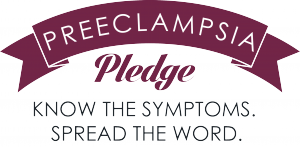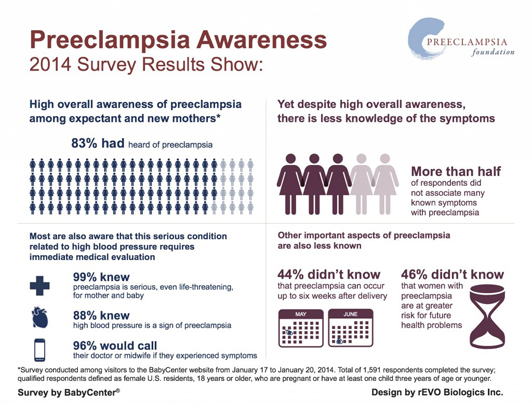2014 Preeclampsia Awareness Survey Highlights Need for Education- Educators Play a Key Role
By: Sharon Muza, BS, LCCE, FACCE, CD/BDT(DONA), CLE | 0 Comments
May is Preeclampsia Awareness Month and childbirth educators play a key role in informing families about the symptoms of this disease of pregnancy (or postpartum.) Eleni Tsigas, the Executive Director of The Preeclampsia Foundation shares the results of a recent survey quizzing women on their awareness of this potentially deadly disease. CBEs and others have a responsibility to share information in a calm, factual way duing class so that women are informed but not scared, should this disease present itself during their childbearing year. - Sharon Muza, Community Manager, Science & Sensibility
 As Executive Director of the Preeclampsia Foundation®, the nation's only patient advocacy organization for preeclampsia and related hypertensive disorders of pregnancy, I'm excited to announce the results of a recent nationwide Preeclampsia Awareness Survey of more than 1,500 expectant and new mothers. These survey findings are driving the Foundation's strategies associated with National Preeclampsia Awareness Month this month.
As Executive Director of the Preeclampsia Foundation®, the nation's only patient advocacy organization for preeclampsia and related hypertensive disorders of pregnancy, I'm excited to announce the results of a recent nationwide Preeclampsia Awareness Survey of more than 1,500 expectant and new mothers. These survey findings are driving the Foundation's strategies associated with National Preeclampsia Awareness Month this month.
The survey, which was conducted by BabyCenter®, shows a high overall awareness of preeclampsia and that it is serious and associated with high blood pressure. There was also near universal knowledge to call a healthcare provider if experiencing symptoms of preeclampsia.
We're very encouraged by the awareness that's been raised in recent years, in sharp contrast to our last study six years ago that found very low overall awareness of preeclampsia. But there's more to do, because this year's survey also shows low awareness when respondents were asked about specific symptoms associated with preeclampsia.
The more a pregnant woman knows about preeclampsia, the more likely she is to recognize and report symptoms to her doctor or midwife. That improves time to diagnosis and medical evaluation, which saves lives - for both mothers and babies. And that's why we're so focused on improving awareness of preeclampsia.
Preeclampsia and other hypertensive disorders of pregnancy remain a leading cause of maternal and infant illness and death. Globally, by conservative estimates, these disorders are responsible for 76,000 maternal and 500,000 infant deaths every year. In the United States, preeclampsia affects one in every 12 pregnancies, and its incidence has increased by 25 percent during the past two decades.

© Preeclampsia Infographic
Key Survey Findings
The recent survey of 1,591 women shows high overall awareness of preeclampsia, its severity and link to high blood pressure, and to immediately report symptoms to their healthcare providers:
- 83% of respondents had heard of preeclampsia and of those women, 99% knew that it is extremely serious, even life-threatening for mother and baby, very serious, or somewhat serious
- 88% knew that high blood pressure is a sign of preeclampsia
- 96% would call their doctor or midwife if they experienced symptoms
Results also show areas that the healthcare community needs to address:
- Raise awareness of the specific symptoms associated with preeclampsia
- 78% incorrectly linked preeclampsia to swelling of the feet
- Only 70% correctly linked preeclampsia to headache and vision changes
- 3 out of 5 women were not sure about several other symptoms
- Educate women on when preeclampsia can occur and its long-term impact
- 44% didn't know that preeclampsia can occur even after the baby is delivered, up to six weeks postpartum
- 46% didn't know that women with preeclampsia are at risk for future health problems
- Improve access to information, regardless of education or income level
- Compared to the 83% of respondents in general who had heard of preeclampsia,
- 51% with some high school education had heard of preeclampsia
- 37% who earned under $25k a year had heard of preeclampsia
Download the Preeclampsia Infographic
Survey Findings Drive Education Campaign
Released in conjunction with Preeclampsia Awareness Month, the survey findings provided the basis of the Foundation's education campaign launched this month. Its theme - Take the Preeclampsia Pledge: Know the Symptoms. Spread the Word - highlights the importance of early recognition and reporting of symptoms. The campaign features Promise Walks for Preeclampsia™ across the country, social media events, and an easy-to-understand and share video called Preeclampsia: 7 Symptoms Every Pregnant Woman Should Know. (Spanish version)
Know the Symptoms. Spread the Word.
Early recognition and reporting of symptoms is the key to timely detection and management of preeclampsia. Women who are pregnant or recently delivered should contact their doctor or midwife right away if they experience any of the symptoms listed below, and healthcare providers should be appropriately responsive. While these symptoms don't necessarily indicate preeclampsia, they are cause for concern and require immediate medical evaluation.
- Swelling of the hands and face, especially around the eyes (swelling of the feet is more common in late pregnancy and probably not a sign of preeclampsia)
- Weight gain of more than five pounds in a week
- Headache that won't go away, even after taking medication for pain relief
- Changes in vision like seeing spots or flashing lights; partial or total loss of eyesight
- Nausea or throwing up, especially suddenly, after mid pregnancy (not the morning sickness that many women experience in early pregnancy)
- Upper right belly pain, sometimes mistaken for indigestion or the flu
- Difficulty breathing, gasping, or panting
- "I just don't feel right"
It's also important to know that some women with preeclampsia have NO symptoms. Healthcare providers can only diagnose preeclampsia by monitoring blood pressure and protein in the urine, which is routinely done at prenatal appointments, so keeping all appointments is vital throughout pregnancy and immediately after delivery.
About the Preeclampsia Awareness Survey
The survey was conducted among visitors to the BabyCenter® website from January 17 to January 20, 2014. A total of 1,591 respondents completed the survey; qualified respondents are defined as female U.S. residents, 18 years or older, who are pregnant or have at least one child three years of age or younger.
About the Preeclampsia Foundation
A U.S.-based 501(c)(3) non-profit organization established in 2000, the Preeclampsia Foundation is dedicated to providing patient support and education, raising public awareness, catalyzing research and improving health care practices, envisioning a world where preeclampsia and related hypertensive disorders of pregnancy no longer threaten the lives of mothers and babies. More information can be found at www.preeclampsia.org or by calling toll-free 800.665.9341.
How do you talk about preeclampsia in your childbirth classes? When do you discuss it? Are you also sharing that postpartum women can also develop this disease? Would you consider showing the brief video above highlighting the seven key symptoms. Let us know how you are discussing this topic in the comments section below. - SM
About Eleni Z. Tsigas

Eleni Z. Tsigas is the Executive Director of the Preeclampsia Foundation. Prior to this position, she served in a variety of volunteer capacities for the organization, including six years on the Board of Directors, two as its chairman. Working with dedicated volunteers, board members and professional staff, Eleni has helped lead the Foundation to its current position as a sustainable, mission-driven, results-oriented organization.
Eleni is married, and had has two of her three pregnancies seriously impacted by preeclampsia. As a preeclampsia survivor, she is a relentless champion for the improvement of patient and provider education and practices, for the catalytic role that patients can have to advance the science and status of maternal-infant health, and for the progress that can be realized by building global partnerships to improve patient outcomes.
Eleni has served as a technical advisor to the World Health Organization (WHO), is a member of the PRE-EMPT Technical Advisory Group and Knowledge Translation Committee (funded by the Gates Foundation), and participates in the Hypertension in Pregnancy Task Force created by the American College of Obstetricians and Gynecologists (ACOG), as well as a similar task force for the California Maternal Quality Care Collaborative (CMQCC). Eleni is frequently engaged as an expert representing the consumer perspective on preeclampsia at national and international meetings, and as a spokesperson in various public speaking venues. She was honored to deliver The Jim & Midge Breeden Lecture as part of ACOG's 2012 Annual Clinical Meeting President's Program.
Published: May 12, 2014
Tags
PregnancyPregnancy ComplicationsPreeclampsia Awareness MonthPreeclampsia FoundationMaternal Infant CareEleni Tsigas